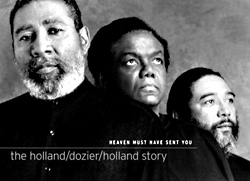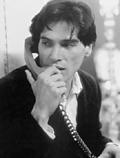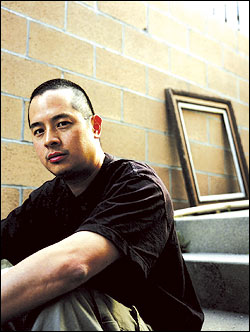VARIOUS ARTISTS
Heaven Must Have Sent You: The Holland/Dozier/Holland Story
(Hip-O)
Motown’s primary architects besides Berry Gordy and Smokey Robinson were staff writer/producers Lamont Dozier and brothers Brian and Eddie Holland. Eddie even cut a few hits as a vocalist, but soon he’d turn full time to the work that made his and his partners’ name: the Supremes’ astounding mid-’60s run of No. 1s, as well as classics for Martha and the Vandellas, the Four Tops, and Jr. Walker and the All Stars. These dominate this retrospective box, which also contains some of the work HDH did after splitting from Motown in 1967. (They would return to the label as freelancers in the mid-’70s.) As is often the case with craftspeople who finally get to express themselves, Dozier and the Hollands turned out not to have much to say: The best later stuff here is either disco (Dozier’s African-inflected cult classic “Going Back to My Roots,” Shalamar’s hits medley “Uptown Festival Pt. 1”) or stomps like their early work. Freda Payne’s “Band of Gold,” from 1970, could be classic Vandellas if it weren’t for a lyric that slyly hints at wedding-night erectile dysfunction: “I wait in the darkness of my lonely room/Hoping soon/That you’ll walk right through that door/And love me like you tried before.”
FUNKADELIC
Funkadelic
(Westbound/Ace)
Another Motown staff songwriter, meanwhile, ran as far in the opposite direction as possible once he left the company. For its opening line alone—”If you will suck my soul, I will lick your funky emotions”—as well as its wandering, lysergic blues-rock, George Clinton’s first album as the leader of Funkadelic wouldn’t have made it to the Hitsville, U.S.A., recording room. (It was issued by Westbound, another Detroit label that would eventually release eight Funkadelic albums, all of which have just been remastered and given bonus tracks by the U.K. label Ace.) But not only do several Motown session players appear on Funkadelic (including bassist Bob Babbit and guitarist Dennis Coffey), the album’s best song, the creeping, oddly passionate group-harmony showcase “I’ll Bet You,” was covered by none other than Motown’s own Jackson 5, on 1970’s ABC album.
BILL FRISELL
East/West
(Nonesuch)
Most of the Funk Brothers —Motown’s crack session band—unwound after cutting hits all day by sitting in at Detroit jazz clubs, so it’s hardly surprising that their licks have long been admired—and extemporized—by jazz artists. Seattle guitarist Bill Frisell’s new two-disc live album opens with an eight-minute version of “I Heard It Through the Grapevine.” From Gladys Knight to Marvin Gaye to Creedence Clearwater Revival, this song has long been served up at least somewhat tense, but on East/West Frisell picks every note deliberately, evoking an amber-coated cross between a dusty-plains drama and a cafe seduction—a nice angle from which to approach the old warhorse.
VARIOUS ARTISTS
Total 6
(Kompakt)
As a pair of dance music–obsessed former auto capitals, Detroit and Germany have long had a symbiotic relationship. Techno—stark not ornamented, the work of individuals rather than group efforts—rules both places, and in its case, Motown tends to apply more as a business model for record labels than a musical blueprint. But it’s hard to miss the nod at the end of the new two-CD compilation from Cologne’s Kompakt label. Over winding, twirling, slurping machine timbres and a galloping beat that’s mixed low enough to be felt rather than pummeled by, the Field’s “Action” hinges on a repetitive melodic fragment that’s eventually abstracted into an aural fractal pattern. The motif: a replaying of the cinematic flute part that keynotes the Four Tops’ 1966 No. 1, “Reach Out, I’ll Be There.” In the Field’s hands, the riff no longer sounds the cavalry but instead underscores a hazy chase scene through the forest—not unlike the Motown sound moving from dominating pop music to being one of its most potent trace elements.








